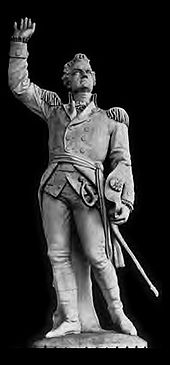Ethan Allen, Potential Loyalist
At Borealia, the blog about early Canadian history, Benjamin Anderson, a doctoral student at the University of Edinburgh, shared some of his research on the Loyalists of Vermont.
More specifically, Anderson wrote on the question of whether Ethan Allen, conqueror of Fort Ticonderoga and then a prisoner of the Crown for three long years, was ready to fall into that category:
More specifically, Anderson wrote on the question of whether Ethan Allen, conqueror of Fort Ticonderoga and then a prisoner of the Crown for three long years, was ready to fall into that category:
It was the summer of 1780 when Ethan Allen, Vermont’s self-proclaimed leader, was approached by a man on a dusty road to Arlington. Beverly Robinson, a Virginian Loyalist and friend of British Commander-in-Chief Henry Clinton, looked down at Allen from atop his horse and handed him a piece of paper. It was a proposal to Allen and Vermont: renounce their commitment to the Union, return to the British Empire, and they could potentially be rewarded with a “separate government under the king and constitution of England” with their lands validated.Allen, and later his brother Ira and their friend Joseph Fay, tried to play the British and Americans off against each other for local advantage. Ultimately the Franco-American victory at Yorktown changed the equation.
Yet that was not the end of the matter for Ethan Allen. Throughout the 1780s, he maintained contact with the British and continued to push for Vermont rejoining the British Empire. He was “as rapacious as a wolf,” according to [Gen. Frederick] Haldimand. As late as 1788, he made overtures about a potential alliance or Vermont rejoining the empire as a means of protecting Vermont from a threatening United States, as well as its invaluable trade that was dependent on Quebec and the St. Lawrence River.Allen’s fame grew from his 1779 Narrative of Colonel Ethan Allen’s Captivity, which appeared before his negotiations with British commanders. His infamy in early America came out of publishing Reason: The Only Oracle of Man, the argument for deism he created with Dr. Thomas Young. As a result, Allen’s dance with Loyalism, and what that says about his status as an American hero, got lost in the shuffle until recent decades.

